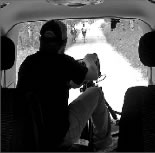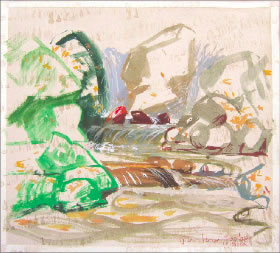by Betsy Kepes
“You been ridin’ the rails?” The man had an old green duffel bag slung over his shoulder.
I could tell he’d checked us out as we stood on the lush lawn by the courthouse in Missoula, Montana. On my back I wore a faded red pack, and across my front I’d strapped my 5-month-old son. Seven-year-old Lee wore his own backpack, and my husband, Tom, leaned over from the weight of the huge load he carried.
“It’s a good way to travel, ain’t it?” The traveler was wiry and not too clean, but then, neither were we. I nodded but noticed my husband squirming, uncomfortable with my fibbing. Sure, we’d been riding the rails, but we’d paid Amtrak for the tickets and had taken the bus down from Whitefish, Montana. Should I tell this drifter that we’d traveled in wide, comfortable seats? That we weren’t homeless wanderers who’d had to toss our baby up to hands waiting inside a moving freight car?
“See you on the road,” the traveler said, and shifted the duffel higher on his back as he walked away.
Middle-class Americans take it for granted that transportation will be convenient and speedy. Put on new tires for a road trip. Hop on a plane. We need to get somewhere fast so we can slow down and relax.
But what about travelers with no car or little money? Buses may be cheap, but they’re also cramped, and these days, what with all the cutbacks, they don’t always take you to the town you want to go to. And too often they deposit their long-distance passengers in dingy waiting rooms in the bad part of town to wait out the night for a connection in the morning.
Train travel – even in a crowded coach – is luxurious. Not only is there more room, but stewards patrol the cars, dispensing tiny pillows and re-arranging passengers so families can sit together. Children travel for half-price on Amtrak and seniors get a discount, so the coaches are filled with frugal travelers. Families haul coolers onto the train to avoid eating in the pricey dining car. The only ones in three-piece suits are the conductors, who stand in the aisle clipping tickets, legs braced, pens and tickets bulging out of their vest pockets.
Since meeting that real hobo in Missoula, my family has crossed the country ten times on Amtrak to get to our summer jobsite in Idaho where we work for the U.S. Forest Service. Usually, when I first board Amtrak, my mind is speeding along ahead of me, cataloguing everything I have to do when I get off the train. I’ve stuffed my daypack with three or four novels, my journal, a laptop, a package of stationery; I’m going to use these days on the train to the utmost. But something magical happens once I’m on board. The swaying of the train as it clicks along the track makes me drowsy. I stare out the window. My book falls onto the floor. I don’t even get annoyed at the kids who run up and down the aisle. I am descending into Amtrak time, a zone where there is no hurry. We’ll get there when we get there, whenever that might be.
I still read, and (after some cajoling) I’ll play cards, and I wander up to the dome car now and then for a stretch. But I’ve lost my edge; in an odd way, I’m on retreat. An Amtrak coach is certainly not a remote monastery, but it is a place where the normal routines of life are gone.
In a coach car, dawn is a very quiet time. Most passengers sprawl across their seats, their jackets tucked around them, heads bent and nodding with the rattle of the train. The baby that cried during the night is sleeping; the active little kids look angelic, their eyes closed, their skinny bodies draped across their parents’ laps. Outside the windows, an orange glow expands across the flat horizon while miles of fields and pasture flow by.
We’ve made it through the discomfort of the moving night. We’re heading West or East, and we’re somewhere in the long wide middle of the country, the part we’d skip completely if we were flying hundreds of miles above the land. We still have a whole day to go, a day of reading, napping, staring out the window and lurching up and down the aisles. But we’re Amtrak veterans now. We’re long-distance traveling companions, and when I look at my neighbor across the aisle, her hair ruffled, her eyes still heavy with sleep, we nod to each other and smile.
Betsy Kepes is a contributor to Writers on the Range, a service of High Country News (hcn.org). She’s a seasonal worker for the Forest Service in Kooskia, Idaho.


